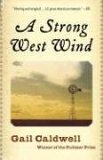Summary | Excerpt | Reviews | Beyond the Book | Readalikes | Genres & Themes | Author Bio

Critics' Opinion:
Readers' Opinion:
First Published:
Feb 2006, 256 pages
Paperback:
Jan 2007, 256 pages
 Book Reviewed by:
Book Reviewed by:
BookBrowse Review Team
Buy This Book
That's
grim fare for a child, no doubt sweetened by the pulpy
promise of Uris and Wouk; like most Americans, as William
Dean Howells noted, I still preferred my tragedies with happy
endings. And not for me the local wars of either Texas or the
Deep South. I was bored by literary accounts of the Alamo and
the Civil War, though this distinction, in which I eschewed
provincial battles for the European fronts of modern war, had
more to do with my father than with any sense of regional shame
or estrangement. Because he had returned unscathed from "his"
war—which had, astonishingly, managed to take place before I
existed—I needed to know everything about it. The legacies of
World War II were part of the story that mattered most: a home
for my unfolding consciousness, with a good-and-evil plot that
offered the last vestige of innocence in America.
Our
fathers had come home to a nation infused with relief and
ideological certainty, two commodities that would never again be
in such abundance. Buoyed by the ticker-tape parades and necessary
fictions that allowed them to go on, they could look beyond
the devastation to a future that promised, at least on the surface,
protection from the past. The lines had been so thoroughly drawn
by the rise of Nazi Germany and the aggression of Japan that our
response was accompanied by a sort of mandatory amnesia—it was
essential, if not easy, to overlook the legacies of a Great War two
decades earlier, in what was billed as the War to End All Wars.
Now
we had Kilroy instead of doughboys; now we had the liberation of
the camps to justify and amend the casualty lists. And we had Dresden,
too, instead of Ypres, but that was a subplot best neglected. If
the campaigns in Europe had demonstrated America's valor, the
ones embellished by Hollywood and Madison Avenue confirmed
it. The darker story, found in classics like The Best Years of Our
Lives and The Naked and the Dead, would outlive the
boosterism
of the postwar years, eventually becoming part of the elegiac truth
about war and modern history. But for now, before the fences went
up, we were still a land of suburban war games and toy bombers,
where the Nazis always got what was coming and where nobody
good ever died—except maybe for a few minutes, only to be resurrected
as the other side's troop commander. Our dads were
heroes—all of them were heroes, it seemed—and it was our tender
burden to be the little soldiers who had made it all worthwhile.
Huddled
there in my barracks on the basement floor of the
Mary E. Bivins Library, I envisioned myself to be of particularly
steely character. Otherwise, how could I bear the horrors of Normandy,
or the lousy C rations that awaited me each day? I lived
for such extended fantasies, believing that the canned peaches
and tinned beef I read about were the food of giants—and that
consuming them, in my imaginary way, would nourish me as
well. This empathic identification guided me in the real world as
often as it transported me into the next. I'd heard all about the
fish-and-chips, wrapped in newspaper and sold for a dime, that
my father had subsisted on in England; though he described
them as dreadful, I ordered them every time I had the chance. Because
the grunts in my war novels were, like him, card sharks and
betting men, I made him play me at gin rummy or casino until I
dropped off to sleep at the kitchen table. It was hardly a parental
sacrifice: In the card games and dominoes we both loved, he was
already grooming a straight man for his pastimes. He had begun
teaching me the bones of arithmetic when I was about four, trying
to outfox me by making change for a quarter. I assumed this, too,
was part of what made a good soldier: Laugh and shake your
head as part of the bluff, never look away from your opponent,
and never bet the farm.
Excerpted from A Strong West Wind by Gail Caldwell Copyright © 2006 by Gail Caldwell. Excerpted by permission of Random House, a division of Random House, Inc. All rights reserved. No part of this excerpt may be reproduced or reprinted without permission in writing from the publisher.





The House on Biscayne Bay
by Chanel Cleeton
As death stalks a gothic mansion in Miami, the lives of two women intertwine as the past and present collide.

The Flower Sisters
by Michelle Collins Anderson
From the new Fannie Flagg of the Ozarks, a richly-woven story of family, forgiveness, and reinvention.

The Funeral Cryer by Wenyan Lu
Debut novelist Wenyan Lu brings us this witty yet profound story about one woman's midlife reawakening in contemporary rural China.
Your guide toexceptional books
BookBrowse seeks out and recommends the best in contemporary fiction and nonfiction—books that not only engage and entertain but also deepen our understanding of ourselves and the world around us.